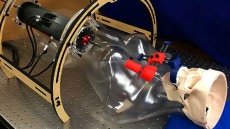A signal protein, that plays a crucial role in controlling the growth of blood vessels, could be used to suppress tumours in prostate cancer, according to a new study published in the British academic journal Oncogene.
The discovery by British researchers from Bristol University and Nottingham University could be used to develop new drugs to improve the long-term management and prognosis for prostate cancer patients, Xinhua reported citing the study that was released Monday.
The research centres on the role in the body of the signal protein, vascular endothelial growth factor (VEGF) which comes in two forms -- pro-angiogenic, which encourages the growth of blood vessels, and anti-angiogenic, which inhibits vascular growth.
According to researchers, in prostate cancer the cancer cells produce pro-angiogenic VEGF to form the new blood vessels that are needed to carry vital nutrients and oxygen to tumours.
As a result, they developed a compound called Sphinx, which can switch the production of VEGF from the pro-angiogenic form to the anti-angiogenic form to block the formation of new blood vessels, and cause the tumours to starve themselves, preventing the growth and spread of the cancer.
Researchers demonstrate that the new chemical could be used successfully to switch the forms of VEGF in mice in the laboratory and prevent tumour growth with very few side effects when given three times weekly by injections.
"This work opens up a new avenue for drug development for prostate cancer," David Bates from Nottingham University said. "This is a new target, and we believe we will be able to make drugs that hit this target in those patients that can benefit, with prostate cancer, and potentially other cancers too," he added.





